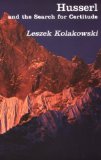

 |

|

The average rating for Husserl and the Search for Certitude based on 2 reviews is 3 stars.
Review # 1 was written on 2015-03-03 00:00:00 Carlos Leyequien Carlos LeyequienThese three lectures, presented as the first Cassirer Lectures at Yale, offer us Kolakowski's very cursory reading of Husserl. In the first lecture, Kolakowski sets up what he believes Husserl is after. In the second he judges whether Husserl was successful and in the third he tries to gather some value from Husserl's work. Throughout, Kolakowski argues that Husserl unsuccessfully sought certainty and opposed skepticism. Philosophy, Kolakowski explains, "must not accept any ready-made results from the sciences and 'generalize' them" (6). But in outlining Husserl's pursuit of certainty, Kolakowski goes in the wrong direction. Instead of emphasizing the intentionality of transcendental subjectivity, the adumbrations of perceived objects, and the always-able-to-be-otherwise character of empirical knowledge, Kolakowski argues that Husserl tried to find absolutely indubitable essences of objects through eidetic variation: "[t]he eidetic insight . . . is not a procedure of abstraction but a special kind of direct experience of universals, which reveal themselves to us with irresistible self-evidence" (45). What, in fact, reveals itself to us with absolute self-evidence, on Husserl's account, are the always incomplete perceptions and the subject-world distinction, among other relations and not, as Kolakowski seems to argue, the essences of objects and universals. In the final section, Kolakowski concludes that the value of Husserl's work lies not in any particular accomplishments, but in his struggle against skepticism and offers us the somewhat odd suggestion that the interminability of this struggle contributes to the development of culture: "it is the conflict of values, rather than their harmony, that keeps our culture alive" (85). Given in the 70s, Kolakowski's treatment is now largely out of date. So I would only recommend this book for its historical value. Someone wanting to read a criticism of Husserl should look for something more recent. |
Review # 2 was written on 2020-03-29 00:00:00 P J ASTA P J ASTABy far the best introduction to Husserl's philosophy I have read so far, even if the discussion of corporeality is largely missing. That latter ommission would explain the explicitly admitted difficulties that Kołakowski gets into in the concluding pages of the book, which some could take as a glimpse away from rationalism and towards mysticism. |
CAN'T FIND WHAT YOU'RE LOOKING FOR? CLICK HERE!!!